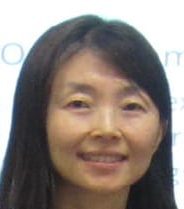
yhkim@um.edu.mo
Tel
(853) 88228287
Office
E21-4105
Consultation Hours
Monday/Thursday 14:00-15:15
Younhee KIM
Introduction
Younhee Kim joined University of Macau in 2018 as Assistant Professor of English. Before she joined the institution, she has taught at National Institute of Education, Nanyang Technological University in Singapore and a few other universities in Korea. She did her MA and PhD at the department of Second Language Studies at the University of Hawai`i at Manoa. Her research interests include Conversation Analysis, Development of Interactional Competence, Parent-Child interaction, and Teacher Education. Her work in these areas appeared in tier one journals such as Journal of Pragmatics, Applied Linguistics, Research on Language and Social Interaction, Journal of Teacher Education, Pragmatics, Text & Talk, and academic handbooks and encyclopedia volumes.
Recently, she is interested in examining how emotion display is used as a resource for negotiation in parent-child interaction and intersects with establishing deontic authority.
Education
Aug. 2003 – Dec. 2009: University of Hawaii at Manoa, Ph.D. in Second Language Acquisition
Aug. 2000 – Aug. 2003: University of Hawaii at Manoa, MA in English as a Second Language
1991 – 1995: Korea University, BA in English Language Education
Research Interests
Conversation Analytic approach to language learning, Conversation Analysis, Child Language, Teacher Education
Courses Regularly Taught
Current:
- Second Language Acquisition
Previously:
- Language Meaning and use
- Understanding Talk-in-Interaction (Introduction to Conversation Analysis)
- Topics in Pragmatics
- Discourse Analysis
- Sociolinguistics
- Theories and Practices in English Language Teaching
- Pragmatic Development in a Second Language
International Pragmatics Association
American Association of Applied Linguistics
The Sociolinguistic Society of Korea
Kim, Y-h. & Fitzgerald, R. D. (2024). Occasioned Semantics and Membership Categorisation Analysis: Fields of Meaning, Categorial Consistency, and Omni-Relevance. Journal of Pragmatics, 226, 17-30. https://doi.org/10.1016/j.pragma.2024.03.017
Kim, Y-h. (2023). Doing “being friends” in conversation-for-learning: From language learner-tutor to buddies. In C. Bushnell & S. Moody (Eds.), Navigating Friendships in Interaction: Discursive and Ethnographic Perspectives (pp. 9-31). Routledge.
Jin, Y., Kim, Y-h., & Chen, H. (2022). Alignment, affiliation, and engagement: Mothers’ wow in parent-child interactions. Research on Language and Social Interaction, 55(3), 279-298. https://doi-org.libezproxy.um.edu.mo/10.1080/08351813.2022.2101299
Kim, Y-h. & Carlin, A. P. (2022). Nextness and story organization: ‘My day’ sequences in parent-child interaction. Text & Talk. https://doi.org/10.1515/text-2020-0137
Jin, Y., Kim, Y-h., & Carlin, A. P. (2022). Co-Topical Small Talk: Troubles-Telling in Traditional Chinese Medical Encounters. Applied Linguistics, 43(3), 493-516. https://doi.org/10.1093/applin/amab057
Kim, Y-h., & Carlin, A. P. (2022). “How was your day?”: Development of Interactional Competence located in today narrative sequences. Pragmatics, 32(2), 246-273. DOI: http://doi.org/10.1075/prag.19043.kim
Kim, Y-h. & Carlin, A. P. (2022). Story Appreciation in Conversations-For-Learning: Stories and Gestalt-Contextures. In A. Filipi, B. Ta & M. Theobald (Eds.), Storytelling practices in home and educational contexts: Perspectives from Conversation Analysis. Springer Nature. https://doi.org/10.1007/978-981-16-9955-9_11
Jin, Y. & Kim, Y-h. (2022). Dietary advice in chronic care: Comparing traditional Chinese and western medicine practiced in mainland China. Social Science & Medicine, 292. https://doi.org/10.1016/j.socscimed.2021.114621
Kim, Y-h., & Tse Crepaldi, Y. (2021). “What? Olaf is the taxi driver?”: Co-construction of spontaneous fantasy narrative in pre-schoolers’ pretend play interaction. Special Issue in Research on Children and Social Interaction. 5(1), 103-128. https://doi.org/10.1558/rcsi.18056
Kim, Y-h., & Crepaldi, Y. T. (2021). Co-constructed storytelling as a site for socialization in parent-child interaction: A case from a Malay-English bilingual family in Singapore. Journal of Pragmatics. https://doi.org/10.1016/j.pragma.2020.11.019
Kim, Y-h., & Silver, R. E. (2021). “What do you think about this?”: Differing Role Enactment in Post-Observation Conversation. In S. Kunitz, N. Markee, & O. Sert (Eds.), Classroom-based Conversation-Analytic Research. Educational Linguitics, vol. 46. Springer. https://doi.org/10.1007/978-3-030-52193-6_15
Carlin, P. A., & Kim, Y-h. (2019). Teaching Qualitative Research: Versions of Grounded Theory. Grounded Theory Review, 29-43.
Kim, Y-h. (2019). Teacher and Professional Conversation. In M. A. Peters & R. Heraud (Eds.), The Encyclopedia of Educational Innovation. Springer. https://doi.org/10.1007/978-981-13-2262-4_69-1
Kim, Y-h. (2019). “What is stoyr- steruh type?”: Knowledge asymmetry, Intersubjectivity, and Learning Opportunities in conversation-for-learning. Applied Linguistics, 40(2), 307-328. https://doi.org/10.1093/applin/amx029
Kim, Y-h. (2018). Repetition with slight variation primarily through final particles in Korean-English bilingual children’s interaction. East Asian Pragmatics, 3(1), 59-90. https://doi.org/10.1558/eap.36195
Kim, Y.-h. (2018). Private speech and mutual engagement in preschoolers’ playtime interaction: Talk and Embodiment. The Sociolinguistic Journal of Korea, 26(2), 119-165. https://doi.org/10.14353/sjk.2018.26.2.05
Kim, Y-h. (2017). Topic initiation in conversation-for-learning: Developmental and pedagogical perspectives. English Teaching, 72, 1. 73-103. https://doi.org/10.15858/engtea.72.1.201703.73
Kim, Y-h., & Silver, R. E. (2016). Provoking reflective thinking in post observation conversations. Journal of Teacher Education, 67(3), 203-219. https://doi.org/10.1177/0022487116637120
Kim, Y-h. (2016). Development of L2 Interactional Competence: Being a Story Recipient in L2 English Conversation. Discourse and Cognition, 23(1), 1-29. https://doi.org/10.15718/discog.2016.23.1.1

